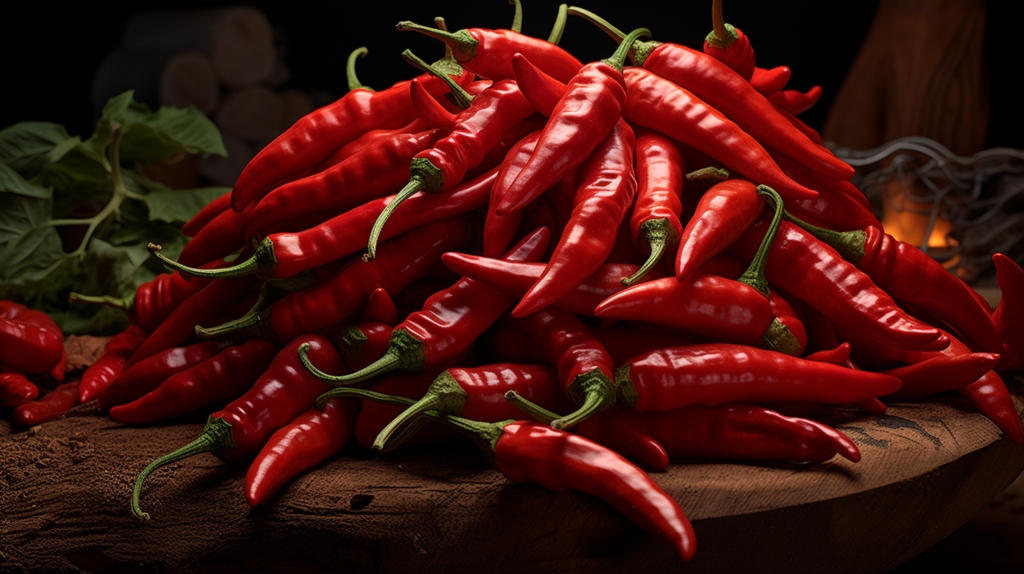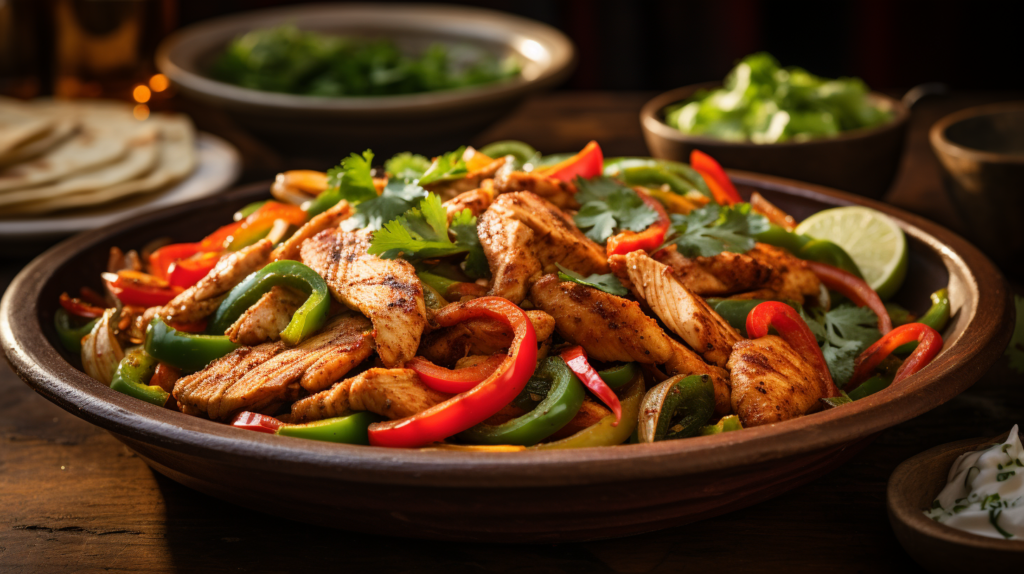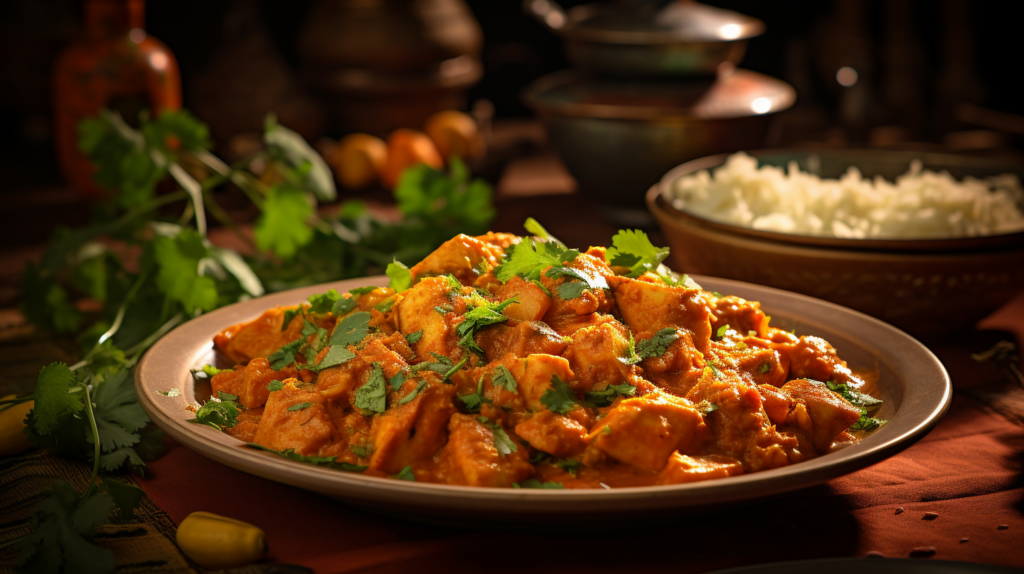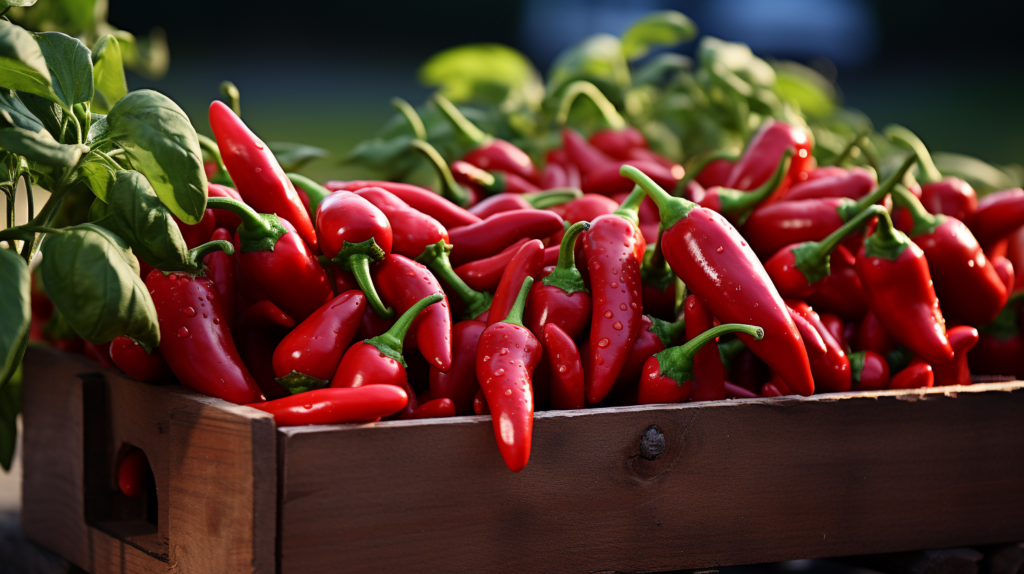If you love spicy foods, you’re not alone. Spicy dishes are enjoyed all over the world for their unique flavors and fiery kick. However, consuming spicy meals may also affect your digestion and metabolism in ways you may not be aware of. In this section, we will explore how spicy foods can impact your digestive health and speed, as well as address common digestion problems associated with consuming these dishes.
主要收获:
- Consuming spicy foods can affect your digestion and metabolism.
- Spicy foods may cause digestion problems such as heartburn and acid reflux.
- It’s important to understand your body’s tolerance to spicy foods to avoid digestive discomfort.
- A balanced diet and healthy lifestyle habits can support healthy digestion of spicy foods.

The Science Behind Spicy Foods and Digestion
Spicy foods have been a part of human diets for centuries, and many people enjoy the exhilarating sensation of heat that they provide. However, if you’ve ever experienced indigestion after eating a spicy meal, you may be wondering how these foods affect your digestive system.
At the core of the matter are compounds called capsaicinoids, which are responsible for the “hot” flavor of spicy foods. When you consume capsaicinoids, they interact with receptors in your mouth and throat, causing a burning sensation. This same chemical reaction also triggers your body’s natural pain response, releasing endorphins that can create feelings of euphoria.
But what about the impact on digestion? One of the primary effects of capsaicinoids is to increase circulation and create a warming sensation in the body. This can stimulate the digestive system, potentially increasing the speed at which food is broken down and absorbed.
However, consuming spicy foods can also lead to indigestion, heartburn, and acid reflux. This is because capsaicinoids can irritate the lining of your stomach, causing it to produce more acid and potentially leading to discomfort and inflammation.
Managing Spicy Food Indigestion
If you’re prone to indigestion or other digestive discomfort after eating spicy foods, there are steps you can take to manage the symptoms. First and foremost, it’s important to stay hydrated and avoid alcohol or caffeine, which can exacerbate digestive issues.
You can also try eating smaller, more frequent meals instead of large, spicy meals. This can help to keep your digestive system from becoming overwhelmed and prevent symptoms like heartburn and acid reflux.
In addition, there are a number of natural remedies that may help to soothe digestive discomfort caused by spicy foods. Ginger, for example, has been used for centuries as a natural remedy for nausea and other digestive ailments. You can try brewing ginger tea or chewing on ginger candy to alleviate symptoms.
Spicy Food and Digestive Health
While spicy foods can offer some benefits for digestion, it’s important to consume them in moderation and balance them with other healthy foods. Too much spice can lead to inflammation and other digestive problems, while a varied diet that includes plenty of fruits, vegetables, and whole grains can help to support overall digestive health.
You can also work with a healthcare provider or registered dietitian to devise a personalized plan for optimal digestive health, which may include avoiding certain trigger foods or taking supplements to support gut health.

How Spicy Foods Affect Metabolism
When you consume spicy foods, your body experiences a thermogenic effect, which means it generates heat. This heat production can potentially increase your metabolic rate, causing your body to burn more calories than it usually would. Some studies suggest that this increase can be as high as 8%.
However, this effect is temporary, and its duration can vary depending on the individual’s tolerance to spicy foods. For some people, the increase in metabolic rate may only last for a short period, whereas for others, it may be sustained for several hours.
It’s essential to note that while spicy foods may have a positive impact on metabolism, they can also cause digestion issues. The capsaicin in spicy foods may irritate the lining of the stomach, causing discomfort, heartburn, and acid reflux, especially when consumed in large quantities or on an empty stomach.
Managing Spicy Food Indigestion
If you experience digestion issues after consuming spicy meals, there are several things you can do to alleviate your symptoms. Drinking milk or eating yogurt can help soothe the burning sensation in your stomach, as these dairy products contain casein, which neutralizes the effects of capsaicin.
You can also try consuming bland foods like rice, bread, or bananas to mitigate the heat generated by spicy foods. Additionally, consuming smaller, more frequent meals can help regulate your digestion and prevent discomfort.
Spicy Foods and Digestion Issues
While spicy foods can potentially increase your metabolic rate, they can also cause digestion issues for some individuals. Symptoms may include stomach pain, diarrhea, and bloating. If you experience these symptoms, it’s important to listen to your body and avoid consuming spicy foods until your symptoms subside.
It’s also essential to practice mindful eating when consuming spicy foods. Eating slowly and chewing your food thoroughly can aid in digestion and prevent discomfort.
Overall, the relationship between spicy foods and metabolism is complex, and its effects can vary greatly depending on the individual’s tolerance and the amount of food consumed. While spicy foods can potentially have positive effects on metabolism, it’s crucial to consume them in moderation and practice mindful eating to avoid any digestion issues.
The Impact of Spicy Foods on Digestive Speed
Spicy foods have a reputation for causing digestive discomfort and speeding up the digestive process. However, with the right approach, it is possible to enjoy spicy meals without experiencing unpleasant symptoms. Here, we will discuss the best foods for easy digestion of spicy meals and provide ways to ease digestion after eating spicy food.
The Best Foods for Easy Digestion of Spicy Meals
When it comes to easing the digestion of spicy meals, certain foods can be particularly helpful. These include:
| 食品 | 益处 |
|---|---|
| 酸奶 | Contains live and active cultures that help restore the balance of good bacteria in the gut. |
| 香蕉 | Contain pectin, a type of fiber that can help soothe the digestive tract. |
| 姜 | Has anti-inflammatory properties that can reduce inflammation in the digestive system. |
| Bland carbohydrates | Provide a neutral base that can help absorb excess spice and soothe the digestive system. |
By incorporating these foods into your diet alongside spicy meals, you can help promote healthy digestion and reduce the risk of discomfort.
Ways to Ease Digestion After Eating Spicy Food
If you do experience digestive discomfort after eating spicy food, there are several ways to ease symptoms. These include:
- Drink plenty of water: Staying hydrated can help flush out excess spice and reduce inflammation.
- Eat slowly and mindfully: Taking time to chew your food thoroughly and savor your meal can help prevent overeating and reduce the risk of indigestion.
- Add cooling ingredients: Incorporating cooling ingredients like cucumber, mint, or coconut milk into your meal can help counteract the heat of spicy spices.
- Take a walk: Light exercise like a short walk can help stimulate digestion and reduce bloating.
By following these tips, you can help ease digestive discomfort and continue to enjoy the flavors and benefits of spicy foods.

Common Digestion Problems Associated with Spicy Foods
Spicy foods are known for their delicious taste and ability to add a punch of flavor to any dish. However, consuming spicy meals can also lead to a range of digestion problems. If you experience any of the following symptoms after consuming spicy foods, you are not alone:
- 胃灼热
- Stomach pain
- 腹泻
- 消化不良
- 燃气
Spicy foods contain compounds like capsaicin that can irritate the lining of the stomach and trigger the release of stomach acid. These compounds can also affect the muscles in your gastrointestinal tract, leading to diarrhea or loose stools.
If you are prone to digestion problems, it’s best to avoid or limit your intake of spicy foods. Alternatively, you can try the following tips:
- Eat smaller portions
- Chew your food slowly and thoroughly
- Avoid lying down immediately after eating
- Stay hydrated by drinking water regularly
- Try natural remedies like ginger or peppermint tea
It’s important to note that if you experience severe or persistent digestive problems after consuming spicy foods, you should consult a medical professional.
Improving Digestion of Spicy Foods: Tips and Remedies
While spicy foods can be delicious and satisfying, they can also cause digestive distress. Here are some natural remedies and tips to improve your digestion of spicy meals:
Mindful Eating
When it comes to enjoying spicy foods, it’s important to practice mindful eating. Take small bites and chew your food thoroughly to aid in the digestion process. Eating too fast or not chewing your food properly can lead to indigestion and discomfort.
Hydration
Drinking plenty of water can help ease digestive discomfort caused by spicy foods. Hydration also helps to move food through your digestive system more efficiently. Aim to drink at least 8 glasses of water per day.
姜
Ginger has natural anti-inflammatory properties that can help soothe digestive distress caused by spicy foods. Try sipping on ginger tea or chewing on a small slice of fresh ginger after consuming a spicy meal.
Fennel
Fennel is another natural remedy that can help ease digestion. Its compounds can help relax the gastrointestinal tract and reduce inflammation. Try chewing on fennel seeds or sipping on fennel tea after consuming a spicy meal.
益生菌
Probiotics can help improve digestion by promoting the growth of good bacteria in your gut. Eating foods that are rich in probiotics, such as yogurt, sauerkraut, and kefir can help promote digestive health and ease discomfort after consuming spicy foods.
Low-Fat Meals
Consuming low-fat meals can help reduce the risk of indigestion when eating spicy foods. High-fat meals can slow down digestion, making it more difficult for your body to process spicy foods. Opt for lean proteins and vegetables when enjoying a spicy dish.
Acidic Foods
Consuming acidic foods, such as citrus fruits, can help counteract the effects of spicy foods. The acid can help balance the alkaline environment in your stomach, promoting better digestion. Try adding a squeeze of lemon to your water or salad after consuming a spicy meal.
Small Portions
It’s important to consume spicy foods in moderation to avoid digestive distress. Start with small portions and gradually increase the amount as your body becomes more accustomed to the spiciness. This can help reduce the risk of indigestion and discomfort.

Understanding Your Body’s Tolerance to Spicy Foods
Spicy foods can be a delightful addition to any meal, but not everyone can handle the heat. When it comes to managing spicy food indigestion, it is crucial to understand your body’s tolerance to spicy foods.
Individuals have varying degrees of spice tolerance, which may depend on factors such as genetics, age, and habitual consumption.
If you are new to spicy foods, it is best to start with milder spices and gradually work your way up to spicier dishes. This allows your body to adjust to the heat and build up tolerance over time.
It is also essential to pay attention to the signs your body gives you. If you experience symptoms such as heartburn, bloating, or stomach discomfort after eating spicy foods, it may be a sign that you need to lower your spice intake or take a break from spicy foods altogether.
此外、 managing spicy food indigestion can be easier by combining spicy foods with other foods that are easier on the digestive system. For example, pairing spicy foods with rice, bread, or potatoes can help balance out the spiciness and aid in digestion.
Tips for Gradually Increasing Your Spice Tolerance
If you are interested in incorporating more spicy foods into your diet, consider the following tips:
- Start small: Begin with milder spices, such as paprika or cumin, and gradually work your way up to spicier dishes.
- Pair with dairy: Dairy products, such as milk or yogurt, contain casein, which helps neutralize the heat in spicy foods.
- Include cooling foods: Incorporate cooling foods like cucumber, watermelon, or mint, which can help ease the heat of spicy foods.
- Take breaks: If you experience digestive issues after consuming spicy foods, take breaks from spicy foods to allow your digestive system to recover.
By understanding your body’s tolerance to spicy foods and gradually increasing your spice intake, you can enjoy spicy foods without experiencing digestive discomfort.

Balancing Spicy Foods with a Healthy Diet
While spicy foods can add excitement and flavor to your meals, it’s important to balance them with a healthy diet. Doing so can help manage spicy food indigestion and promote overall digestive health.
When incorporating spicy foods into your diet, consider the following tips:
- Start small: If you’re new to spicy foods, start with milder options and gradually increase your tolerance over time.
- Pair with healthy choices: Pair spicy dishes with healthy choices like vegetables, lean proteins, and whole grains to create a balanced meal.
- Stay hydrated: Drinking plenty of water can help soothe your digestive system and prevent dehydration.
- Avoid spicy foods before bed: Consuming spicy foods close to bedtime can increase the risk of acid reflux and disrupt your sleep.
Additionally, it’s important to be mindful of how often you consume spicy foods. Overindulging can lead to digestion problems and potentially negative impacts on your overall health.
Remember, spicy foods can be a delicious addition to your diet, but it’s important to enjoy them in moderation and in balance with other healthy choices. By doing so, you can safeguard against spicy food digestion problems and promote optimal digestive health.
Lifestyle Habits to Support Healthy Digestion of Spicy Foods
To support healthy digestion of spicy foods, incorporating mindful lifestyle habits is crucial. Here are some tips to help manage spicy food indigestion:
- Practice Mindful Eating: Pay attention to your body’s signals and eat slowly to give your digestive system time to process the food properly.
- Stay Hydrated: Adequate water intake can reduce the risk of heartburn and other digestive problems caused by spicy foods.
- Exercise Regularly: Physical activity can help promote digestion and reduce stress, which can also contribute to digestive problems.
- Manage Stress: High levels of stress can lead to digestive problems, such as acid reflux. Try incorporating relaxation techniques, such as yoga or meditation, into your daily routine.
By implementing these lifestyle habits, you can help support healthy digestion of spicy foods and reduce your risk of experiencing digestive discomfort.

结论
In conclusion, it’s clear that the consumption of spicy foods can have an impact on digestion. However, with mindful eating and moderation, it is possible to enjoy spicy meals while maintaining digestive health.
Throughout this article, we have explored the influence of spicy foods on metabolism and digestive speed, as well as common digestion problems associated with consuming spicy meals. We have also discussed strategies for managing indigestion caused by spicy foods, best foods for easy digestion, and natural remedies to improve digestion.
平衡的重要性
While spicy foods can offer unique flavor and health benefits, it is essential to balance their consumption with a healthy overall diet. Incorporating plenty of whole foods and limiting processed foods and added sugars can support healthy digestion.
Lifestyle Habits for Digestive Health
In addition to dietary adjustments, lifestyle habits also play a key role in promoting optimal digestion. Mindful eating, staying hydrated, regular exercise, and stress management strategies can all support healthy digestion and ease digestion problems associated with spicy foods.
Remember, it’s crucial to listen to your body and understand your own spice tolerance. Gradually increasing your tolerance and consuming spicy foods in moderation can help you enjoy their unique flavors without experiencing digestive discomfort.
Overall, incorporating spicy foods into a balanced diet and practicing mindful consumption and moderation can support optimal digestion and overall health. Keep these tips in mind for a happy and healthy digestive system!
常见问题
How do spicy foods affect digestion?
Spicy foods can potentially speed up digestion due to their effect on metabolism. However, they can also cause digestion problems such as heartburn, acid reflux, and stomach discomfort in some individuals.
What is the science behind the impact of spicy foods on digestion?
Spicy foods contain compounds like capsaicin that stimulate the release of digestive enzymes and increase metabolic rate. Managing indigestion caused by consuming spicy meals is crucial for maintaining digestive health.
Can spicy foods increase metabolism?
Yes, consuming spicy meals can potentially increase your metabolic rate. This increase in metabolism may lead to faster digestion, but it can also cause digestion issues for some people.
How do spicy foods influence digestive speed?
Spicy foods can impact the speed of your digestive process. They can potentially accelerate digestion due to increased metabolic activity. However, they can also cause discomfort and digestion problems in some individuals.
What are some common digestion problems associated with spicy foods?
Common digestion problems associated with consuming spicy foods include heartburn, acid reflux, and stomach discomfort. These symptoms can vary in severity and affect individuals differently.
Are there any tips or remedies to improve digestion of spicy foods?
Yes, there are several tips and natural remedies that can help improve the digestion of spicy foods. These include eating smaller portions, drinking milk or yogurt, avoiding lying down immediately after eating, and trying ginger or peppermint tea.
How can I understand my body’s tolerance to spicy foods?
Individual differences in spice tolerance exist. You can gradually increase your tolerance to spicy foods by starting with milder dishes and gradually incorporating spicier options into your diet. Listening to your body’s signals is key.
Is it important to balance spicy foods with a healthy diet?
Yes, it is important to balance spicy foods with a healthy overall diet. While spicy foods can have certain benefits, consuming an excessive amount or relying solely on spicy meals can negatively impact digestive health. Moderation is key.
What lifestyle habits can support healthy digestion of spicy foods?
Mindful eating, proper hydration, regular exercise, and stress management can all support healthy digestion of spicy foods. These habits promote optimal digestion and overall digestive well-being.
What are the key takeaways regarding the influence of spicy foods on digestion?
Spicy foods can potentially increase metabolism and accelerate digestive speed. However, they can also cause digestion problems such as heartburn and acid reflux. It is important to understand your body’s tolerance, balance spicy foods with a healthy diet, and adopt lifestyle habits that support healthy digestion.














